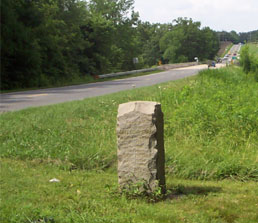Due to the distance from Charles Towne, residents of the present
counties of York, Chester, and Lancaster, were not concerned with the British
in the first years of the Revolutionary War. This would change as the war progressed.
Cherokee Indians, who aligned with the British during the war, attacked settlements
in this area. Major Frank Ross and his York County battalion with the aid of
the Catawbas repulsed most attacks.
 South
Carolina’s fighting with the British became most intense in 1780. Charles
Towne fell on May 12, 1780. From then, the British pushed inland with Colonists
and other settlements surrendering to them. Hills Iron Works was a foundry located
on Allison Creek in York County. The foundry, which, during and leading up to
the Revolutionary War, produced cannons and ammunition for the Patriots. It
was the only Foundry of its kind south of Virginia. A British emissary attended
a meeting at Hills Iron Works. He stood and spoke of parole and protection for
those in attendance and stated that the Continental Congress would not fight
for them. William Hill interrupted the emissary, told the audience that his
claims were false, and that he should “disappear with his proclamations
… in fear of the resentment of the audience.”
South
Carolina’s fighting with the British became most intense in 1780. Charles
Towne fell on May 12, 1780. From then, the British pushed inland with Colonists
and other settlements surrendering to them. Hills Iron Works was a foundry located
on Allison Creek in York County. The foundry, which, during and leading up to
the Revolutionary War, produced cannons and ammunition for the Patriots. It
was the only Foundry of its kind south of Virginia. A British emissary attended
a meeting at Hills Iron Works. He stood and spoke of parole and protection for
those in attendance and stated that the Continental Congress would not fight
for them. William Hill interrupted the emissary, told the audience that his
claims were false, and that he should “disappear with his proclamations
… in fear of the resentment of the audience.”
The Citizens elected Andrew Neal and William Hill as officers
in their militia. Other patriots in the area soon joined them. Colonel Patrick
Ferguson of the British was recruiting a Tory force in the western part of York
District. Tory Captain Christian Huck moved in and attacked all the property
around Hills Iron Works, and Huck burned the forge, furnace, grist and sawmills
with all the other buildings in the area.
Captain Huck traveled south to Williamson’s Plantation
close to Bethesda Presbyterian Church near Brattonsville. On July 12th, 1780,
Captain Huck and his men of 300 were attacked and defeated there. This battle
came to be known as the Battle of Huck’s Defeat. Colonial forces moved
from there and met British forces at Cowpens and Kings Mountain, which are considered
the turning points of the Revolutionary War.
Lord Cornwallis was headquartered in Winnsboro after defeating
American forces in Camden. Once the defeat of British forces at Cowpens was
realized, Lord Cornwallis took his men to search for the victors. His search
brought him to Nations Ford, but he could not cross due to flooding of the Catawba.
Cornwallis made camp at Spratt’s plantation for several days before moving
south to Lands Ford.
 South
Carolina’s fighting with the British became most intense in 1780. Charles
Towne fell on May 12, 1780. From then, the British pushed inland with Colonists
and other settlements surrendering to them. Hills Iron Works was a foundry located
on Allison Creek in York County. The foundry, which, during and leading up to
the Revolutionary War, produced cannons and ammunition for the Patriots. It
was the only Foundry of its kind south of Virginia. A British emissary attended
a meeting at Hills Iron Works. He stood and spoke of parole and protection for
those in attendance and stated that the Continental Congress would not fight
for them. William Hill interrupted the emissary, told the audience that his
claims were false, and that he should “disappear with his proclamations
… in fear of the resentment of the audience.”
South
Carolina’s fighting with the British became most intense in 1780. Charles
Towne fell on May 12, 1780. From then, the British pushed inland with Colonists
and other settlements surrendering to them. Hills Iron Works was a foundry located
on Allison Creek in York County. The foundry, which, during and leading up to
the Revolutionary War, produced cannons and ammunition for the Patriots. It
was the only Foundry of its kind south of Virginia. A British emissary attended
a meeting at Hills Iron Works. He stood and spoke of parole and protection for
those in attendance and stated that the Continental Congress would not fight
for them. William Hill interrupted the emissary, told the audience that his
claims were false, and that he should “disappear with his proclamations
… in fear of the resentment of the audience.”